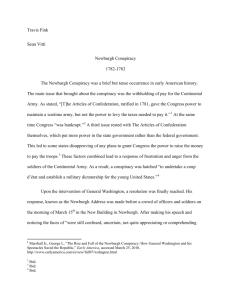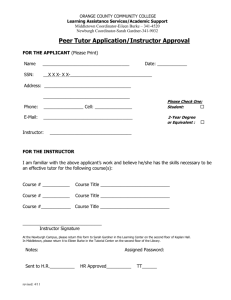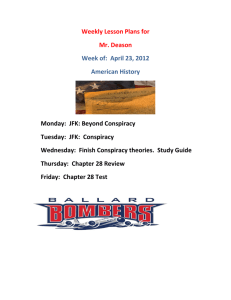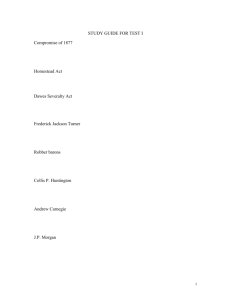George Washington and the Newburgh Conspiracy Introduction
advertisement
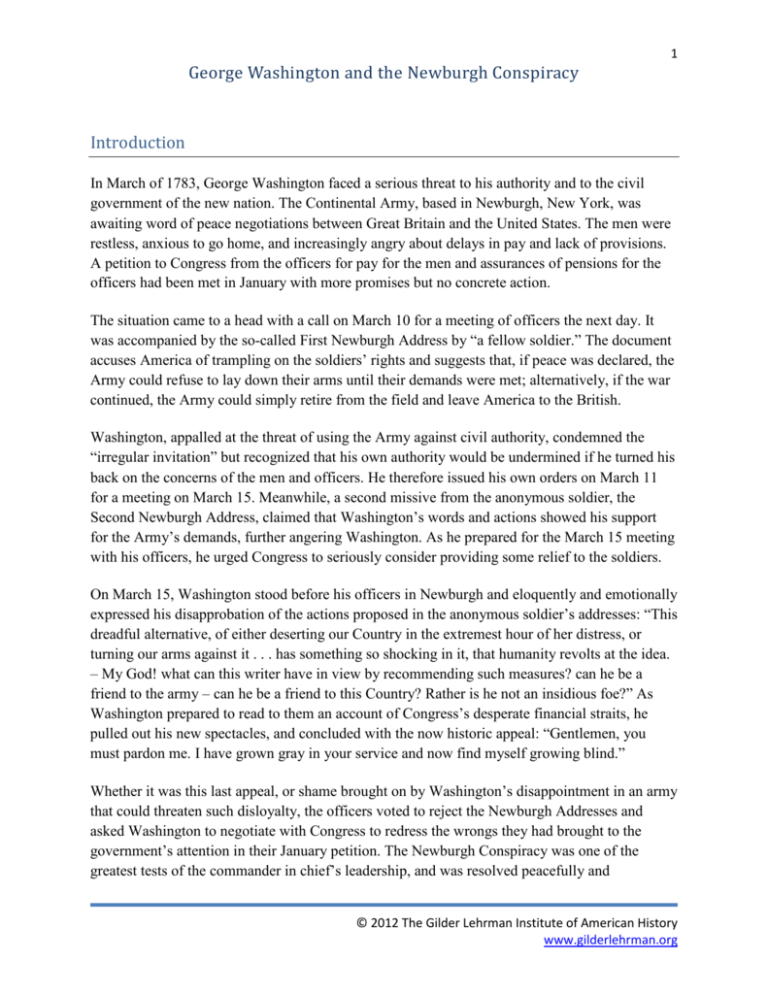
George Washington and the Newburgh Conspiracy 1 Introduction In March of 1783, George Washington faced a serious threat to his authority and to the civil government of the new nation. The Continental Army, based in Newburgh, New York, was awaiting word of peace negotiations between Great Britain and the United States. The men were restless, anxious to go home, and increasingly angry about delays in pay and lack of provisions. A petition to Congress from the officers for pay for the men and assurances of pensions for the officers had been met in January with more promises but no concrete action. The situation came to a head with a call on March 10 for a meeting of officers the next day. It was accompanied by the so-called First Newburgh Address by “a fellow soldier.” The document accuses America of trampling on the soldiers’ rights and suggests that, if peace was declared, the Army could refuse to lay down their arms until their demands were met; alternatively, if the war continued, the Army could simply retire from the field and leave America to the British. Washington, appalled at the threat of using the Army against civil authority, condemned the “irregular invitation” but recognized that his own authority would be undermined if he turned his back on the concerns of the men and officers. He therefore issued his own orders on March 11 for a meeting on March 15. Meanwhile, a second missive from the anonymous soldier, the Second Newburgh Address, claimed that Washington’s words and actions showed his support for the Army’s demands, further angering Washington. As he prepared for the March 15 meeting with his officers, he urged Congress to seriously consider providing some relief to the soldiers. On March 15, Washington stood before his officers in Newburgh and eloquently and emotionally expressed his disapprobation of the actions proposed in the anonymous soldier’s addresses: “This dreadful alternative, of either deserting our Country in the extremest hour of her distress, or turning our arms against it . . . has something so shocking in it, that humanity revolts at the idea. – My God! what can this writer have in view by recommending such measures? can he be a friend to the army – can he be a friend to this Country? Rather is he not an insidious foe?” As Washington prepared to read to them an account of Congress’s desperate financial straits, he pulled out his new spectacles, and concluded with the now historic appeal: “Gentlemen, you must pardon me. I have grown gray in your service and now find myself growing blind.” Whether it was this last appeal, or shame brought on by Washington’s disappointment in an army that could threaten such disloyalty, the officers voted to reject the Newburgh Addresses and asked Washington to negotiate with Congress to redress the wrongs they had brought to the government’s attention in their January petition. The Newburgh Conspiracy was one of the greatest tests of the commander in chief’s leadership, and was resolved peacefully and © 2012 The Gilder Lehrman Institute of American History www.gilderlehrman.org George Washington and the Newburgh Conspiracy 2 respectfully. The Army’s concerns were never completely addressed, but Washington’s urgent request that they work with rather than against the government and Congress’s actions to redress some of the problems, carried the military, and the nation, through the end of the war. Documents related to the Newburgh Conspiracy were collected by the Army and, according to Washington’s General Orders of March 18, “being too prolix to be inserted into the Records of the Army, will be lodged at the orderly office, to be perused or copied by any Gentleman of the Army who may think proper.” Questions for Discussion Read the document introduction, closely examine the images, and apply your knowledge of American history to answer these questions: 1. Describe the specific complaint and two specific threats of the First Newburgh Address. 2. What did Washington mean when he asked if the soldier who wrote the complaint was “an insidious foe”? 3. How does the Newburgh Conspiracy help us to understand the grave dangers the young nation faced? 4. How did Washington’s response help to defuse the situation? © 2012 The Gilder Lehrman Institute of American History www.gilderlehrman.org Image George Washington and the Newburgh Conspiracy 3 Letterbook related to the Newburgh Conspiracy, March 1783. (Gilder Lehrman Collection, GLC02437.09443) © 2012 The Gilder Lehrman Institute of American History www.gilderlehrman.org Transcript George Washington and the Newburgh Conspiracy 4 Letterbook related to the Newburgh Conspiracy, March 1783. (Gilder Lehrman Collection, GLC02437.09443) Cantonment, 15 March 1783. Agreeably to the general orders of the 11th instant, the officers of the American Army being convened, His Excellency the Commander in Chief was pleased to open the meeting with the following address to them, on the subject of their being called together, which with some other papers were left for the consideration of the assembly, the Hon. Major General Gates being president. The Address from His Excellency is as follows “To The General, Field, and other Officers, Assembled at the New Building, pursuant to the general order of the 11 instant March Head Quarters, Newburgh, 15 March 1783. Gentlemen, By an anonymous summons, an attempt has been made to convene you together – How inconsistent with the rules of propriety – how unmilitary – and how subversive of all order [inserted: and discipline] let the good sense of the army decide. – [60] In the moment of this summons, another anonymous production was sent into circulation; addressed more to the feelings and passions, than to the reason and judgement of the army. – The author of the piece is entitled to much credit for the goodness of his pen – and I could wish he © 2012 The Gilder Lehrman Institute of American History www.gilderlehrman.org George Washington and the Newburgh Conspiracy 5 had as much credit for the rectitude of his heart, – for as men see through different optics, and are induced, by the reflective faculties of the mind, to use different means to attain the same end – the author of the address should have had more charity, than to mark for suspicion, the man who should recommend moderation and longer forbearance, – or in other words, who should not think as he thinks, and act as he advises. – But he had another plan in view, in which candor and liberality of sentiment, regard to justice, and love of Country have no part, and he was right to insinuate the darkest suspicion to effect the blackest designs. That the address is drawn with great art, and is designed to answer the most insidious purposes – that it is calculated to impress the mind with an idea of premeditated injustice in the sovereign power of the United States, and rouse all those resentments which must unavoidably flow from such a belief – that the secret mover of this scheme, (whoever he may be) intended to take advantage [61] of the passions, while they were warmed by the recollection of past distresses, without giving time for cool, deliberative thinking, and that composure of mind which is so necessary to give dignity and stability to measures, – is rendered too obvious, by the mode of conducting the business, to need other proof than a reference to the proceeding. Thus much, gentlemen, I have thought it incumbent on me to observe to you, to shew upon what principles I opposed the irregular and hasty meeting which was proposed to have been held on Tuesday last, – and not because I wanted a disposition to give you every opportunity, consistent with your own honor and the dignity of the Army, to make known your grievances. – If my conduct heretofore has not evinced to you that I have been a faithful friend to the army, my declaration of it at this time would be equally unavailing and improper – But, as I was among the first who embarked in the cause of our common Country – as I have never left your side one moment, but when called from you on public duty – as I have been the constant companion and witness of your distresses, and not among the last to feel and acknowledge your merits – as I have ever considered my own military reputation as inseparably connected with that of [62] the army – as my heart has ever expanded with joy, when I have heard its praises – and my indignation has arisen, when the mouth of detraction has been opened against it – it can scarcely be supposed, at this late stage of the war, that I am indifferent to its interests. © 2012 The Gilder Lehrman Institute of American History www.gilderlehrman.org George Washington and the Newburgh Conspiracy 6 But how are they to be promoted? The way is plain, says the anonymous addresser – If war continues, remove into the unsettled country – there establish yourselves, and leave an ungrateful Country to defend itself – But who are they to defend? – our wives, our children, our farms and other property which we leave behind us – Or, in this state of hostile separation, are we to take the two first (the latter cannot be removed) to perish in a wilderness, with hunger, cold and nakedness – ? If Peace takes place, never sheath your swords, says he, until you have obtained full and ample justice. – This dreadful alternative, of either deserting our Country in the extremest hour of her distress, or turning our arms against it, (which is the apparent object, unless Congress can be compeled into instant compliance) has something so shocking in it, that humanity revolts at the idea. – My God! what can this [63] writer have in view by recommending such measures? – can he be a friend to the army – can he be a friend to this Country? – Rather is he not an insidious foe –? Some emissary, perhaps, from New York, plotting the ruin of both, by sowing the seeds of discord and separation between the civil and military powers of the Continent? – And what a compliment does he pay to our understanding, when he recommends measures, in either alternative impracticable in their Nature? But here, Gentlemen, I will drop the curtain; – because it would be as imprudent in me to assign my reasons for this opinion, as it would be insulting to your conception, to suppose you stood in need of them. – A moment’s reflection will convince every dispassionate mind of the physical impossibility of carrying either proposal into execution. There might, Gentlemen, be an impropriety in my taking notice, in this address to you, of an anonymous production – But the manner in which that performance has been introduced to the army – the effect it was intended to have – together with some other circumstances, will amply justify my observations on the tendency of that writing. – With respect to the advice given by the author – to suspect the man who shall recommend moderate measures and longer forbearance – I spurn it – as every [64] man who regards that liberty, and reveres that justice, for which we contend, undoubtedly must. –For if men are to be precluded from offering their sentiments on a matter, which may involve the most serious and alarming consequences that can © 2012 The Gilder Lehrman Institute of American History www.gilderlehrman.org George Washington and the Newburgh Conspiracy 7 invite the consideration of mankind – reason is of no use to us – the freedom of speech may be taken away – and dumb and silent, we may be led, like sheep, to the slaughter. I cannot, in justice to my own belief, and what I have great reason to conceive is the intention of Congress, conclude this address, without giving it as my decided opinion, that that honorable body entertain exalted sentiments of the services of the army – and from a full conviction of its merits and sufferings, will do it complete justice – That their endeavors, to discover and establish funds for this purpose, have been unwearied, and will not cease till they have succeeded, I have not a doubt –But, like all other large bodies, where there is a variety of different interests to reconcile, their deliberations are slow. – Why then should we distrust them? – and, in consequence of that distrust, adopt measures which may cast a shade over that glory which has been so justly acquired, and tarnish the reputation of an army which is celebrated thro’ [65] all Europe, for its fortitude and patriotism? – And for what is this done? – to bring the object we seek for nearer? – No! most certainly, in my opinion, it will cast it at a greater distance. – For myself (and I take no merit in giving the assurance, being induced to it from principles of gratitude, veracity and justice) – a grateful sense of the confidence you have ever placed in me – a recollection of the cheerful assistance and prompt obedience I have experienced from you, under every vicissitude of fortune – and the sincere affection I feel for an army I have so long had the honor to command – will oblige me to declare, in this public and solemn manner, That in the attainment of complete justice for all your toils and dangers, and in the gratification of every wish, so far as may be done consistently with the great duty I owe my Country and those powers we are bound to respect, you may freely command my services to the utmost of my abilities. While I give you these assurances, and pledge myself in the most unequivocal manner, to exert whatever ability I am possessed of in your favor, [struck: let me request you Gentlemen to rely on the plighted faith of your Country] [66] let me entreat you, Gentlemen, on your part, not to take any measures, which, viewed in the calm light of reason, will lessen the dignity and sully the glory you have hitherto maintained – Let me request you to rely on the plighted faith of your Country, and place a full confidence in the purity of the intentions of Congress, – that, previous © 2012 The Gilder Lehrman Institute of American History www.gilderlehrman.org George Washington and the Newburgh Conspiracy 8 to your dissolution as an army, they will cause all your accounts to be fairly liquidated, as directed in their resolutions which were published to you two days ago, – and that they will adopt the most effectual measures in their power to render ample justice to you, for your faithful and meritorious services. – And let me conjure you, in the name of our common Country – as you value your own sacred honor – as you respect the rights of humanity – and as you regard the military and national character of America, to express your utmost horror and detestation of the man, who wishes, under any specious pretences, to overturn the liberties of our country, and who wickedly attempts to open the flood gates of civil discord, and deluge our rising Empire in blood. By thus determining – and thus acting, you will pursue the plain and direct road to the attainment of your wishes – [67] You will defeat the insidious designs of our enemies, who are compeled to resort from open force to secret artifice. – You will give one more distinguished proof of unexampled patriotism and patient virtue, rising superior to the pressure of the most complicated sufferings – and you will, by the dignity of your conduct, afford occasion for posterity to say, when speaking of the glorious example you have exhibited to mankind, “had this day been wanting, the world had never seen the last stage of perfection to which human nature is capable of attaining.” (Signed) G.Washington.” © 2012 The Gilder Lehrman Institute of American History www.gilderlehrman.org
